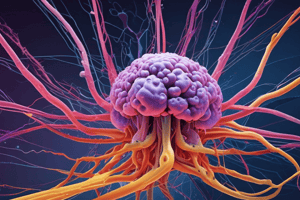Podcast
Questions and Answers
What is the primary function of gustation?
What is the primary function of gustation?
- Perception of light
- Detection of sound waves
- Sense of taste (correct)
- Regulation of body temperature
Which of the following is an example of a glucocorticoid hormone?
Which of the following is an example of a glucocorticoid hormone?
- Cortisol (correct)
- Aldosterone
- Thyroxine
- DHEA
What is the name of the tube that connects the middle ear to the back of the throat?
What is the name of the tube that connects the middle ear to the back of the throat?
- Eustachian tube (correct)
- Auditory tube
- Olfactory tube
- Gustatory tube
What is the term for the process by which the number of receptors for a hormone increases?
What is the term for the process by which the number of receptors for a hormone increases?
Which of the following hormones are also neurotransmitters and secreted from the adrenal medulla?
Which of the following hormones are also neurotransmitters and secreted from the adrenal medulla?
What are the two major categories of hormones based on their chemical structure?
What are the two major categories of hormones based on their chemical structure?
Flashcards are hidden until you start studying
Study Notes
The Nervous System - Senses
- General sensation receptors include:
- Mechanoreceptors (respond to mechanical stimuli)
- Thermoreceptors (respond to temperature changes)
- Nociceptors (respond to pain stimuli)
- Chemoreceptors (respond to chemical changes)
- Special senses include:
- Vision
- Hearing
- Taste
- Smell
- Balance
- Receptive field: the specific area of the body that a particular sensory receptor is responsible for detecting stimuli from
- Gustation: the sense of taste
- Olfaction: the sense of smell
- Inner ear structures and functions:
- Cochlea: converts sound waves into electrical signals
- Vestibule: detects head position and movement
- Semicircular canals: detect rotational movement
- Eustachian tube: connects the middle ear to the back of the throat, helping to equalize air pressure
- The three layers of the eye from most superficial to deepest:
- Sclera (white, outer layer)
- Choroid (middle layer with blood vessels)
- Retina (inner layer with light-sensitive cells)
The Endocrine System
- Hypothalamic releasing hormones: stimulate the release of other hormones from target glands
- Hypothalamic inhibiting hormones: inhibit the release of other hormones from target glands
- Target glands affected by hypothalamic hormones include:
- Pituitary gland
- Adrenal glands
- Thyroid gland
- "Releasing" means stimulating the release of another hormone
- "Inhibiting" means blocking the release of another hormone
- The two "thyroid hormones" are:
- Triiodothyronine (T3)
- Thyroxine (T4)
- The three major categories of the adrenal cortex and their examples are:
- Mineralocorticoid hormones (e.g., aldosterone)
- Glucocorticoid hormones (e.g., cortisol)
- Androgen hormones (e.g., DHEA)
- The two hormones that are also neurotransmitters and secreted from the adrenal medulla are:
- Epinephrine (adrenaline)
- Norepinephrine
- The three general categories of hormones based on chemical structure are:
- Steroid hormones
- Amino acid-derived hormones
- Peptide hormones
- Up-regulation of receptors: an increase in the number of receptors on a target cell, making it more responsive to hormone signals
- Down-regulation of receptors: a decrease in the number of receptors on a target cell, making it less responsive to hormone signals
- The four ways for hormones to be eliminated from the body are:
- Metabolism by enzymes
- Excretion by the kidneys
- Excretion by the liver
- Degradation by proteases
Studying That Suits You
Use AI to generate personalized quizzes and flashcards to suit your learning preferences.




